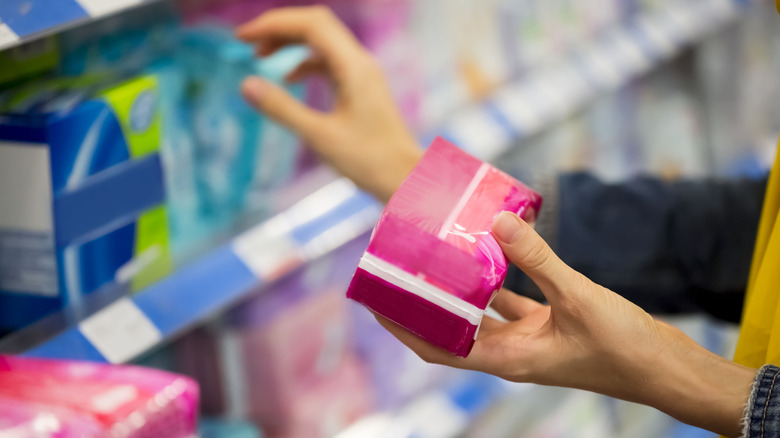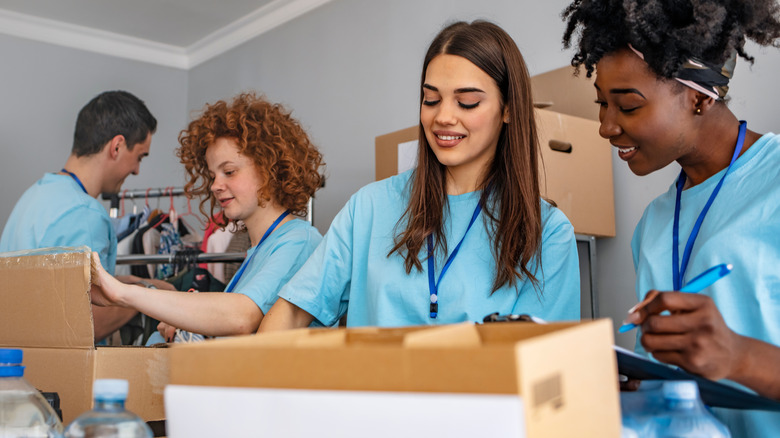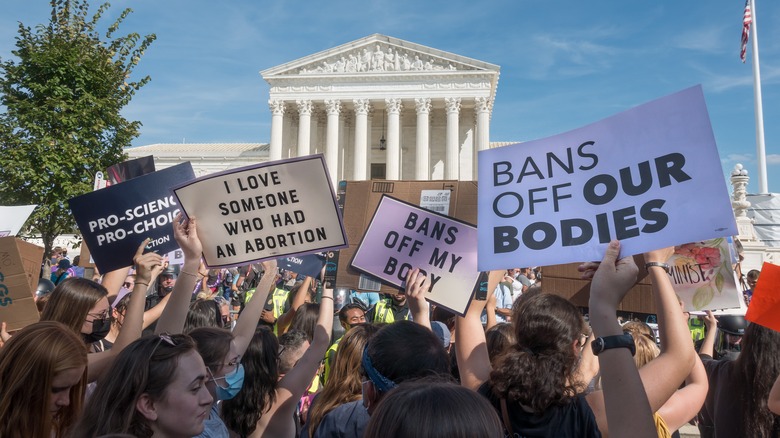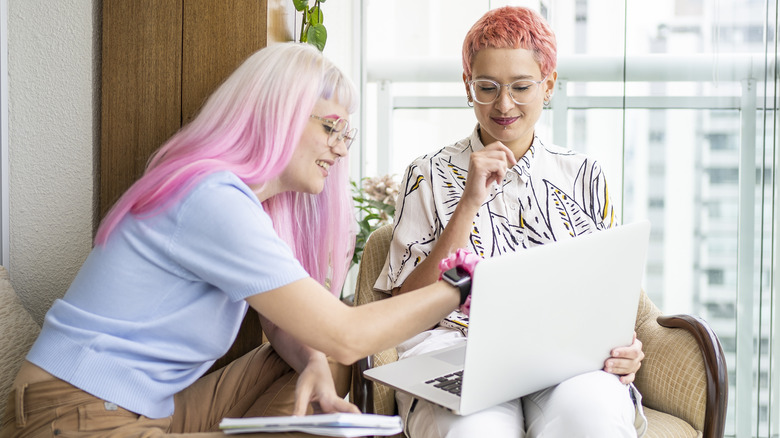5 Ways To Take Part In Period Poverty Awareness Week (Because The Fight Is Far From Over)
It can be easy for some of us to take menstrual products for granted. For many of us in Western countries, we can just go to any local drugstore to pick up a box of tampons or a package of pads. However, there are still countless menstruating people who aren't able to obtain these crucial supplies for a variety of reasons. The most prevalent of these reasons, unfortunately, is that these supplies are often too expensive for people to consistently purchase.
This is considered a tenet of a silent crisis referred to as period poverty, which also includes inaccessibility to hygiene products and menstruation education. According to The Alliance for Period Supplies, two out of five people have recently struggled to purchase period products, a major problem given that half of the American population experiences menstruation. Thankfully, activists are advocating for more accessible products through Period Poverty Awareness Week, which runs from May 22 to May 28. If you are looking to get involved, here are some effective and helpful ways to spread this important message.
Talk openly about menstruation
One reason why period poverty continues to thrive is due to the stigma surrounding discussing menstruation. Even before movies like "Turning Red" became a source of outrage due to its frank discussions on the topic, many people have found menstruation difficult to talk about due to the taboo surrounding it. Unfortunately, by perpetuating the idea that periods are dirty or unappealing to talk about, many menstruating people are unable to speak honestly and openly about how period poverty affects them. This leads to internalized shame that prevents them from accessing necessary information or resources about menstrual hygiene.
This stigma can have serious consequences for younger menstruating individuals, especially those in developing countries where education on menstruation is limited. Therefore, the best way to start highlighting the period poverty crisis is to break down these stigmas and talk about menstruation openly and candidly. Post resources or infographics on your social media accounts and host discussions on how menstruation discrimination directly affects you and others. Furthermore, give examples of this discrimination in the real world: unsustainable prices, lack of accessible reusable products, and menstrual inequity in prisons are just some examples of the ways period poverty impacts people's lives on a daily basis. There are also various statistics from reputable sources that back the idea of a worldwide crisis in effect.
Period poverty is perpetuated by the idea that people will be too afraid of stigmas to talk about it, and that needs to be proven wrong. By taking the first crucial steps and beginning conversations on how it affects everyone who menstruates, you can educate both yourself and others around you.
Host a product drive
The most immediate way to make a direct community impact on period poverty is to host a product drive. A drive allows people to donate unused pads, tampons, and other products that will go directly to menstruating individuals in need, such as those living in shelters. Period.org recommends connecting with organizations like the National Coalition for the Homeless, Women's Shelter's and Transitional Housing, and the Domestic Violence Shelter & Resource Locator to donate collected products. You can even connect with local businesses and see if they would like to get involved. Advertise the drives on social media and in online activist groups to spread the word about your drive.
Another option is seeing if any student organizations at local middle or high schools would be interested in hosting a drive as well. While this particular approach might involve more planning and organization, it will ultimately encourage the younger generation to do more hands-on work.
You can also help host a drive that is directly affiliated with a major organization. Many groups, such as Period Action, accept donations, with a special emphasis on reusable period products. As the title implies, you can rewash and reuse these products, often resulting in less waste and more consistent protection. Some of these organizations also encourage advocates to set up their own local chapters, which leads directly into...
Become a vocal advocate
While donating products and posting important facts on social media is helpful, arguably, the best way to make a difference is to make your voice heard. After all, the period poverty crisis involves both state and national governments, as well as the ongoing reproductive rights debate. Becoming a member of an advocacy organization is a great way to stay directly involved in ongoing developments in the cause. Some examples of groups you can join include New York-Based org For Women, By Women, and Alliance for Period Supplies, which organize events for speaking out in support of ending period poverty, along with donation drives. Period Project, meanwhile, helps provide education about menstruation and period poverty throughout the country. Teaming up with other activists, such as those wanting more freedom for obtaining birth control or abortions, is another important step to cultivating a supportive audience.
Creating petitions can also be an effective way to spread this important message, especially locally. These petitions can range from requiring businesses to supply menstrual products in their bathrooms to working to eliminate discriminatory taxes placed on them. Gathering signatures in support of easier access to menstrual products is a great way to prove to lawmakers that, yes, the inaccessibility to these important tools is negatively affecting constituents. You can also potentially set up an email or phone call campaign to these lawmakers, drafting a template outlining the urgency of your demands. Of course, this doesn't just apply to local governments – you can also try spreading the petition statewide to highlight just how urgent a solution is needed.
Shop smart
If you're someone who menstruates, you'll know that not every product is created equally. The same principal can easily be applied to the companies that make them. There are a few brands that directly support efforts to combat period poverty, which means you should consider investing in them over those that don't.
Arguably, the most well-known of these brands is U by Kotex, which manufactures a variety of menstrual products for different needs. They are a founding sponsor of the aforementioned Alliance for Period Supplies, the same organization that officially recognizes Period Poverty Awareness Week. However, there are a few smaller companies that deserve your recognition. Organic product distributor Cora has donated millions of products to communities around the world, while reusable pad and underwear company Aisle has distributed over 17,000 products throughout 18 countries. If you are looking to make a difference, put your money where your mouth is.
Support the international menstruating community
It's important to remember that period poverty is not just an issue in the United States. Not even close, in fact. Per the World Bank, a staggering 500 million menstruating individuals around the world lack access to either menstrual products or waste management systems that allow them to care for their menstrual health. Period poverty is a global issue that needs to be combatted, and to ignore it would be a major disservice to the entire cause.
You can expand your activism worldwide by researching region-specific international causes. There are several of them out there right now, including ActionAid and Gramalaya, that you can support via monetary or product donations. Days For Girls, meanwhile, works to provide education on menstruation and reproductive health resources to young women in developing nations. You can also help draw attention to social issues surrounding period poverty by posting about the unique challenges some countries face on your social media channels.
It's also important to promote education about who is affected by menstruation. Part of this is undoing the gender-essentialist idea that only women can menstruate. Many trans men, nonbinary people, and intersex individuals can also menstruate, and using inclusive language such as menstruating people can go a long way. It's also important to educate yourself and others on how non-cisgender people navigate period poverty so you can help do something about it.





